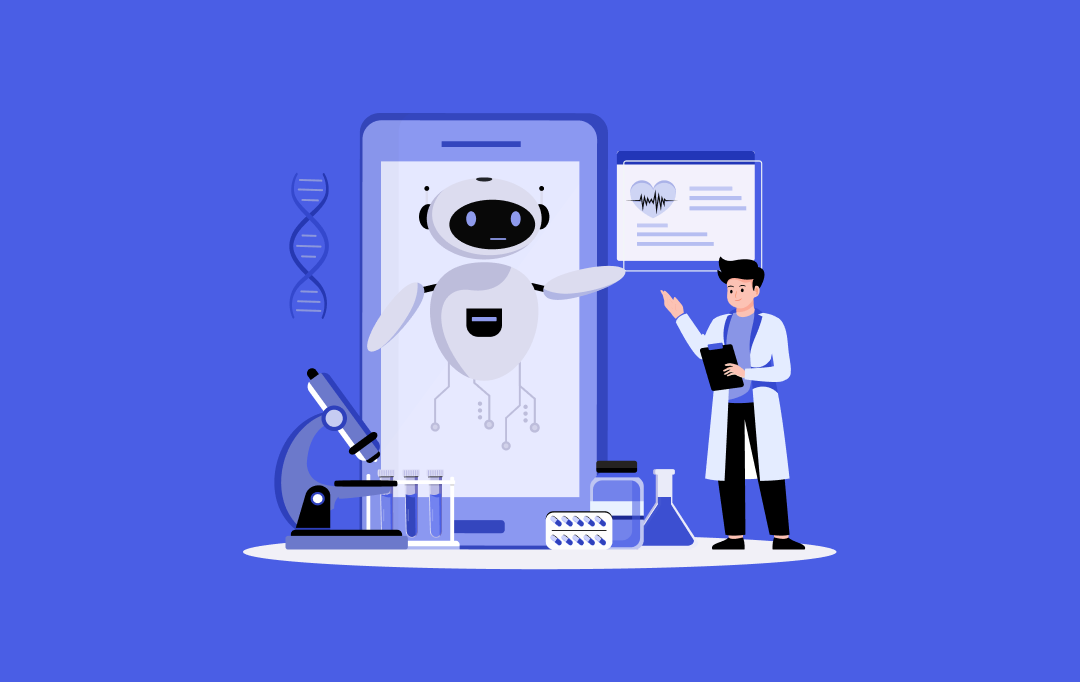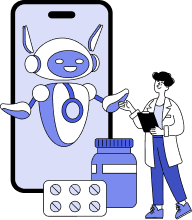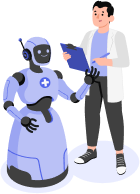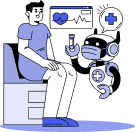- Benefits of AI in Biotech
- Accelerating Drug Discovery and Development
- Enabling Personalized Medicine
- Enhancing Disease Diagnosis and Early Detection
- Optimizing Bioprocessing and Manufacturing
- Advancing Agricultural Biotechnology
- Reducing Costs and Increasing Efficiency
- Ethical and Regulatory Considerations
- Use Cases of AI in Biotech
- Drug Discovery and Development
- Genomics and Precision Medicine
- Protein Structure Prediction
- Medical Imaging and Diagnostics
- Biomarker Discovery
- Clinical Trial Optimization
- Synthetic Biology and Metabolic Engineering
- Agriculture and Food Technology
- Environmental Biotechnology
- Regulatory Compliance and Quality Control
- Real-World Examples of AI in Biotech: Healthcare Providers and Clinical Researchers Leading the Revolution
- Mount Sinai Health System: Establishing AI-Driven Drug Discovery Centers
- Cleveland Clinic: Quantum-AI Biomedical Research Partnerships
- Johns Hopkins Medicine: Translating AI Research into Clinical Applications
- Challenges of AI in Biotech and Solutions
- Technical and Scientific Challenges
- Approval Pathways and Validation
- Ethical and Social Considerations
- High Development Costs
- Future Trends in AI in Biotech and Emerging Technologies: 2025-2030 Technology Roadmap
- Appinventiv: Your Trustworthy AI Development Partner For Your Biotech Reimagination
- FAQs
Key takeaways:
- AI transforms biotech: AI streamlines drug discovery, personalized medicine, diagnostics, and bioprocessing, significantly reducing time and costs.
- Real-world impact: Institutions like Mount Sinai and Johns Hopkins leverage AI for drug discovery and clinical applications, driving healthcare innovation.
- Market growth: The pharmaceutical AI market is projected to grow from $1.94 billion in 2025 to $16.49 billion by 2034, at a 27% CAGR.
- Ethical challenges: AI must address data privacy, bias, and regulatory compliance to ensure equitable and safe outcomes.
- Future trends: By 2030, AI is expected to advance mRNA therapies, gene editing, synthetic biology, nanotechnology, and green biotechnology, thereby fostering sustainability and health equity.
In the spring of 2020, as COVID-19 surged worldwide, scientists and healthcare researchers were thrust into a high-stakes race against time. Labs were overwhelmed, grappling with massive datasets—viral genomic sequences, patient health records, and clinical trial outcomes—while trying to develop treatments and vaccines.
Before the surge of AI in biotechnology, researchers faced daunting pain points: manually sifting through billions of data points, struggling to predict viral mutations, and enduring lengthy trial-and-error cycles to identify viable drug candidates. These inefficiencies led to delays, missed opportunities, and immense pressure on teams racing to save lives. The absence of sophisticated technology made the process feel like searching for a needle in a haystack, with global health hanging in the balance.
Enter AI in biotech—a transformative force that could have clarified this chaos.
Picture those same scientists, but this time, they’ve got an AI-powered system in their corner.
AI-powered systems can analyze vast datasets in hours, not months, pinpointing promising drug candidates precisely. AI streamlines workflows, reduces errors, and accelerates breakthroughs by predicting viral mutations and optimizing clinical trial designs.
Suddenly, the chaos is tamed. Workflows are smoother, decisions are smarter, and breakthroughs come faster. For healthcare research organizations, AI isn’t just a tool—it’s a game-changer that makes the impossible possible, cutting through the noise to efficiently deliver life-saving solutions.
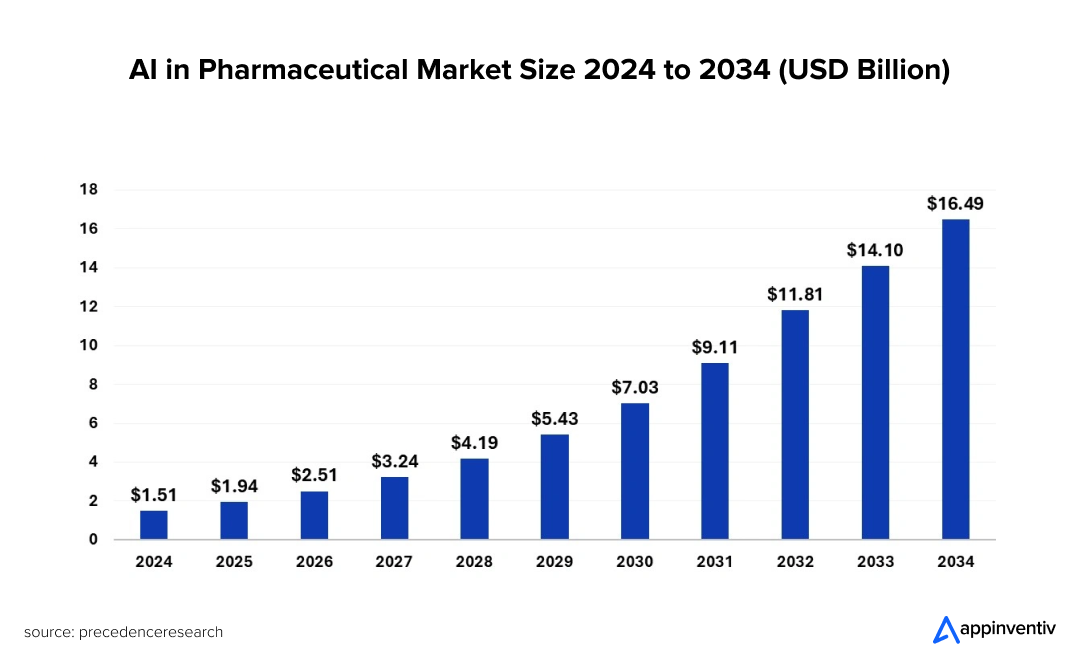
This isn’t just a lab story—it’s a global revolution. The pharmaceutical AI market is exploding, and the numbers back it up. Experts project the market will skyrocket from $1.94 billion in 2025 to a jaw-dropping $16.49 billion by 2034, growing at a compound annual rate of 27%. (Precedence Research)
That kind of growth signals how critical AI is becoming in biotech, from drug discovery to personalized medicine. It’s no surprise why: AI’s ability to transform complex challenges into streamlined solutions is reshaping the industry, and the world is noticing. Biotech firms can leverage Causal AI to uncover cause-and-effect relationships in clinical data, enhancing decision-making.
In this blog, we’ll explore the proven benefits of AI biotech and real-world use cases, demonstrating how artificial intelligence in pharma and biotech paves the way for a healthier future.
Accelerate breakthroughs and streamline research with AI. Act now to lead the biotech revolution!
Benefits of AI in Biotech
AI and Biotech have transformed how we address global challenges, from developing life-saving drugs to engineering crops for food security. However, traditional biotech processes are often time-consuming, expensive, and complex. AI in biological research unlocks new possibilities by combining AI’s data-driven insights with biotech’s biological expertise. Let’s delve into the key benefits of artificial intelligence in biotechnology and showcase its potential to reshape the industry.
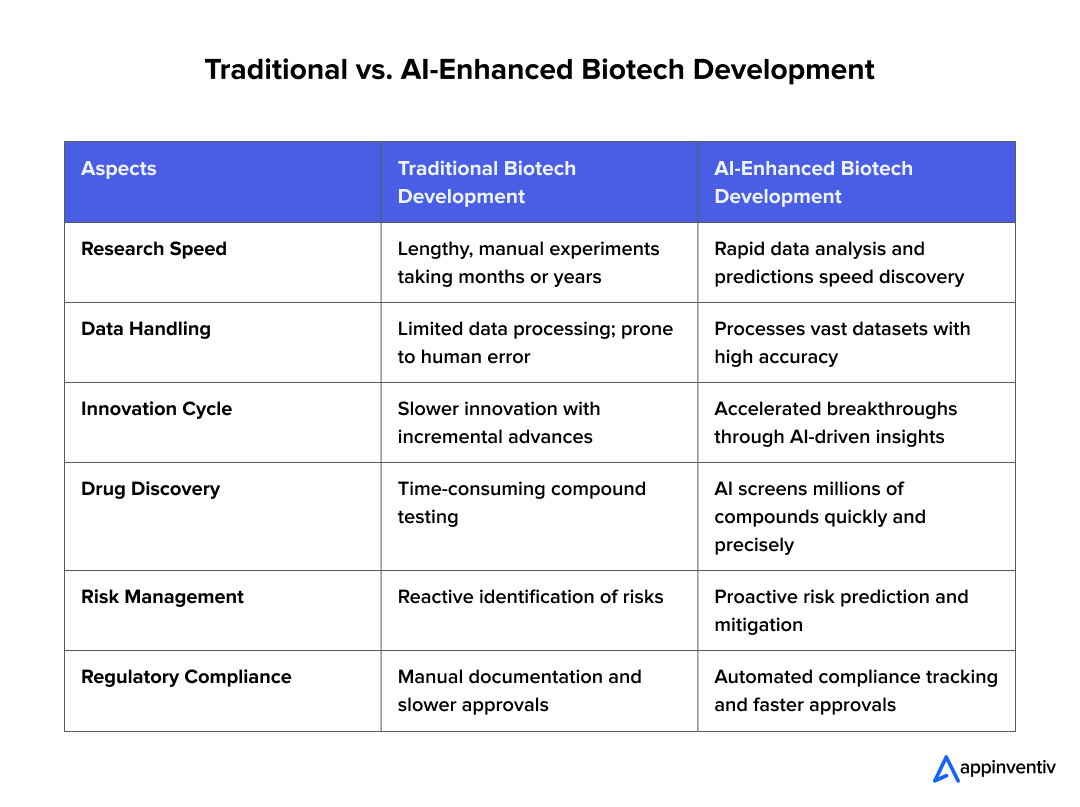
Accelerating Drug Discovery and Development
One of the most significant contributions of AI in life sciences is its ability to streamline drug discovery and development. Developing a new drug typically takes over a decade and costs billions of dollars, with a high failure rate in clinical trials. AI is changing this paradigm by:
- Predicting Drug-Target Interactions: AI algorithms, particularly machine learning in healthcare systems, analyze vast datasets of chemical compounds and biological targets to predict how molecules will interact with their targets. This reduces the need for exhaustive lab testing.
- Identifying Novel Drug Candidates: AI platforms can screen millions of compounds in silico (via computer simulations) to identify promising drug candidates, significantly speeding up the initial discovery phase.
- Optimizing Clinical Trials: AI initiates clinical trials by identifying suitable patient cohorts, predicting outcomes, and monitoring real-time data to adjust trial parameters.
For example, companies like DeepMind have utilized AI models, such as AlphaFold, to solve protein folding problems, providing valuable insights into protein structures that are critical for drug design. This has reduced the time required to understand complex biological mechanisms from years to hours.
Enabling Personalized Medicine
Personalized medicine, which tailors treatments to individual patients based on their genetic makeup, lifestyle, and environmental factors, is a cornerstone of modern biotechnology. AI enhances this field by:
- Genomic Analysis: An AI algorithm processes large-scale genomic data to identify mutations, biomarkers, and disease patterns. This enables precise diagnostics and targeted therapies.
- Predictive Modeling: Machine learning models predict how patients respond to specific treatments, allowing doctors to choose the most effective therapies with minimal side effects.
- Real-Time Monitoring: AI-powered wearable devices and healthcare app development enable the analysis of patient data in real-time, allowing for continuous monitoring and personalized treatment adjustments.
For instance, AI-driven platforms like IBM Watson Health analyze genetic profiles to recommend personalized cancer treatments, thereby improving patient outcomes and reducing the trial-and-error associated with therapy selection.
Enhancing Disease Diagnosis and Early Detection
Early and accurate diagnosis is crucial for effective treatment, and AI in medical diagnosis enables faster, more precise, and accessible diagnostics. Key applications include:
- Medical Imaging Analysis: AI algorithms, particularly deep learning models, excel at analyzing medical images, including X-rays, MRIs, and CT scans. They can detect anomalies, such as tumors or fractures, with accuracy comparable to or better than that of human experts.
Bonus Read: Cost to Build a DICOM Medical Imaging Software
- Pattern Recognition: AI identifies subtle patterns in patient data, such as electronic health records or lab results, that may indicate early-stage diseases like cancer or Alzheimer’s.
- Point-of-Care Diagnostics: AI-powered tools enable rapid diagnostics in resource-limited settings, such as using smartphone apps to analyze blood samples for infectious diseases.
For example, Google Health’s AI model for diabetic retinopathy screening has demonstrated high accuracy in detecting the condition, enabling early intervention in underserved communities.
Optimizing Bioprocessing and Manufacturing
Biotechnology relies heavily on bioprocessing—producing biologics like vaccines, antibodies, and enzymes. AI optimizes these processes by:
- Process Automation: AI-driven healthcare automation systems monitor and control bioprocessing parameters, such as temperature, pH, and nutrient levels, to maximize yield and quality.
- Predictive Maintenance: AI predicts equipment failures before they occur, reducing downtime and ensuring consistent production.
- Quality Control: Machine learning models analyze production data to detect deviations, ensuring biologics meet stringent regulatory standards.
This is particularly impactful in vaccine production, where AI has optimized fermentation processes, reduced costs, and scaled up production during global health crises, such as the COVID-19 pandemic.
Advancing Agricultural Biotechnology
AI transforms agricultural biotechnology, addressing challenges to food security and sustainability. Key benefits include:
- Crop Improvement: AI analyzes plant genomes to identify traits for disease resistance, drought tolerance, or higher yields, accelerating the development of genetically modified crops.
- Precision Agriculture: AI-powered tools, such as drones and sensors, monitor soil health, water levels, and crop conditions, enabling farmers to optimize resource use.
- Pest and Disease Management: Machine learning models predict pest outbreaks and disease spread, enabling targeted interventions that reduce pesticide use.
For instance, AI-driven platforms, such as those developed by Bayer and Monsanto, analyze environmental and genetic data to create crops that thrive in changing climates, thereby supporting global food security.
Reducing Costs and Increasing Efficiency
The integration of artificial intelligence in biotechnology significantly reduces costs across the value chain. By automating repetitive tasks, optimizing experimental designs, and minimizing trial-and-error, AI lowers the financial barriers to innovation. For example:
- Virtual Screening: AI reduces the need for costly physical experiments by simulating biological and chemical interactions.
- Data Integration: AI consolidates disparate datasets—genomic, proteomic, and clinical—into unified platforms, reducing the time and cost of data analysis.
- Resource Allocation: AI optimizes lab workflows, ensuring researchers focus on high-value tasks rather than manual processes.
This cost-efficiency enables smaller biotech and AI startups to compete with larger players, fostering innovation and diversity in the industry.
Ethical and Regulatory Considerations
While AI offers immense benefits, its integration into biotech raises ethical and regulatory challenges. AI systems must be transparent, unbiased, and AI Regulation and Compliance, like HIPAA or GDPR. Biotech companies are increasingly using AI to navigate these challenges by:
- Ensuring Data Privacy: AI models are designed to anonymize patient data, protecting privacy while enabling research.
- Bias Mitigation: Machine learning algorithms are trained on diverse datasets to avoid biases in diagnostics or treatment recommendations.
- Regulatory Compliance: AI tools help companies streamline regulatory submissions by predicting approval outcomes and identifying potential issues.
Use Cases of AI in Biotech
AI Biotech is revolutionizing biotechnology, driving innovation across diverse applications from drug discovery to environmental sustainability. By leveraging advanced algorithms, machine learning, and data analytics, AI in Biotechnology enhances efficiency, precision, and scalability in addressing complex biological challenges.
Below, we explore the comprehensive applications of artificial intelligence in biotechnology, highlighting real-world examples and their transformative impact.
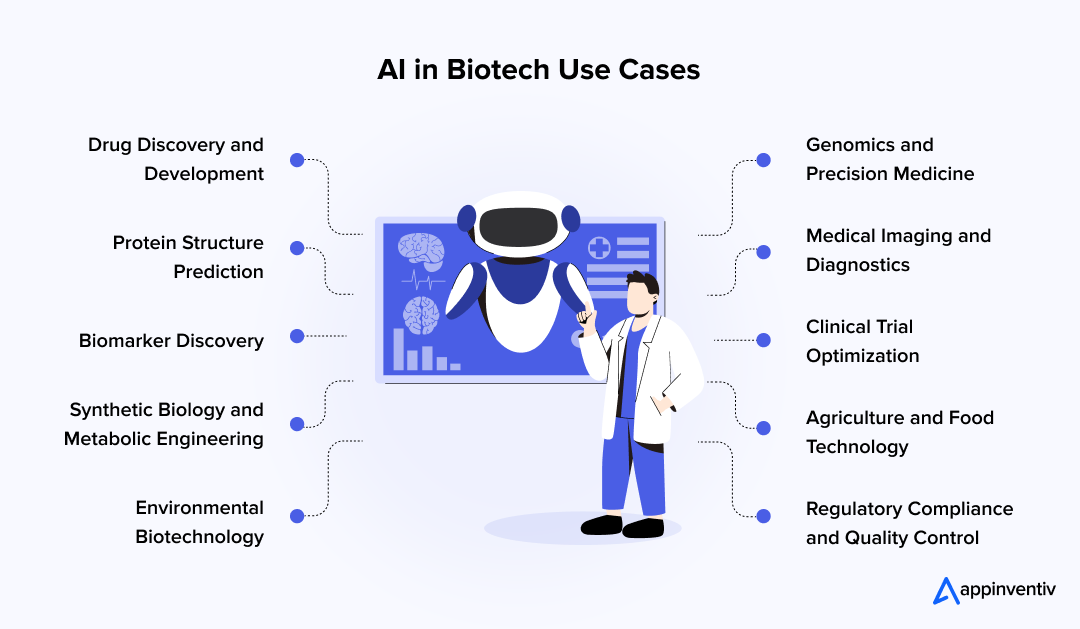
Drug Discovery and Development
AI in biotechnology significantly reduces the traditional 10-15-year drug development timeline by predicting molecular behavior and identifying promising compounds more efficiently than conventional methods.
Key Applications:
- Compound Screening: AI in drug discovery analyzes millions of molecular structures to identify potential drug candidates in weeks instead of years
- Target Identification: Machine learning models predict protein targets for specific diseases with 85% accuracy.
- Toxicity Prediction: Deep learning systems forecast adverse effects before costly clinical trials begin
Impact:
Companies like Atomwise have reduced drug discovery costs by 40-60% while improving success rates. Their AI platform identified potential COVID-19 treatments in just days. (Source: Redress Compliance).
Genomics and Precision Medicine
AI in genomics transforms raw genetic data into actionable medical insights, enabling the development of personalized treatment strategies that improve patient outcomes and reduce healthcare costs.
Core Applications:
- Variant Analysis: AI interprets genetic mutations to predict disease risk and treatment response.
- Pharmacogenomics: Algorithms determine optimal drug dosages based on an individual’s genetic profile.
- Cancer Genomics: Machine Learning Identifies Tumor-Specific Mutations for Targeted Therapy Selection.
Impact:
Foundation Medicine’s comprehensive genomic profiling enables the selection of precision treatments. Genomically matched therapies demonstrate significantly higher overall response rates in clinical trials. Their FDA-approved tests analyze 324 cancer genes to identify actionable mutations for selecting targeted therapy. (Source: National Center for Biotechnology Information)
Protein Structure Prediction
Accurate structure prediction enables researchers to design molecules that target specific protein binding sites precisely. For rare diseases caused by protein misfolding, AI predictions help scientists understand the molecular basis of these conditions and design therapeutic interventions. This has accelerated the development of treatments for diseases like COVID-19, where researchers used predicted structures of viral proteins to identify potential drug targets.
Breakthrough Technologies:
- AlphaFold: Google’s AI predicted structures for 200+ million proteins with atomic-level accuracy.
- Drug Design: AI-predicted protein structures facilitate rational drug design, thereby reducing the need for trial-and-error approaches.
- Enzyme Engineering: Companies use AI-guided protein modification to design custom enzymes for industrial applications.
Impact:
Biotech firms using AI for protein analysis complete structural studies dramatically faster than traditional X-ray crystallography methods. AI tools like ESMFold achieve predictions 60x faster than AlphaFold, enabling analysis of millions of proteins in weeks rather than decades. (Source: The Decoder)
Medical Imaging and Diagnostics
AI-powered imaging enables faster and more accurate diagnoses, reducing human error and healthcare costs. AI algorithms can accurately analyze various medical images, including X-rays, MRIs, CT scans, and ultrasounds. Deep learning models are trained on vast datasets to identify patterns, abnormalities, and subtle changes that human eyes might miss. This leads to the earlier detection of conditions such as cancer, cardiovascular disease, and neurological disorders.
Diagnostic Applications:
- Radiology: AI in Radiology detects cancer, fractures, and organ abnormalities with 95 %+ accuracy
- Pathology: Computer vision analyzes tissue samples to identify disease markers
- Ophthalmology: AI screens for diabetic retinopathy and macular degeneration in routine eye exams
Impact:
Google’s AI system diagnoses diabetic retinopathy with over 90% accuracy, achieving 97% sensitivity and 92% specificity that matches specialist performance while delivering results in under 10 minutes compared to traditional review processes that can take weeks. (Source: MIT Technology Review)
Biomarker Discovery
Data analytics in healthcare analyzes patient data to identify biomarkers that appear before clinical symptoms manifest. It also predicts how patients will respond to specific treatments. This is particularly valuable in oncology, where AI analyzes tumor genetics to predict which patients will benefit from targeted therapies, such as immunotherapy or specific chemotherapy regimens.
Discovery Methods:
- Multi-omics Integration: AI combines genomic, proteomic, and metabolomic data to find novel biomarkers.
- Liquid Biopsies: Machine learning detects circulating tumor DNA for early cancer screening
- Neurological Markers: AI analyzes speech patterns and movement data to identify early-stage neurodegeneration.
Impact:
Companies like Grail utilize AI to detect over 50 types of cancer from blood samples, achieving a specificity of 99.5% for cancer detection. (Source: Fierce Biotech)
Clinical Trial Optimization
AI revolutionizes clinical trial optimization by harnessing advanced algorithms to boost efficiency. It accelerates patient recruitment by precisely matching eligible candidates using vast datasets, such as health records. AI predicts trial outcomes by modeling scenarios with historical and real-time data, enabling proactive adjustments. This transformative approach drives faster, more effective drug development.
Optimization Strategies:
- Patient Matching: AI identifies ideal trial participants based on complex eligibility criteria.
- Site Selection: Algorithms predict which locations will be most effective in recruiting participants.
- Adaptive Trials: Machine learning adjusts trial protocols in real-time based on interim results.
Impact:
Clinical research sites that utilize AI technology have achieved reductions in screening time of up to 90%. Additionally, AI adoption can decrease trial costs by 30-35% through improved data management and streamlined recruitment processes. (Source: Clinical Leader)
Synthetic Biology and Metabolic Engineering
Synthetic biology and metabolic engineering involve designing and modifying biological systems or organisms to perform specific functions, often by reprogramming their genetic and metabolic pathways. By leveraging AI, researchers can model, predict, and fine-tune these systems, enabling precise control over biological functions for applications such as developing eco-friendly chemicals, improving crop yields, or efficiently producing novel therapeutics.
Engineering Applications:
- Pathway Design: AI optimizes metabolic pathways for maximum product yield.
- Organism Engineering: Machine learning guides genetic modifications for desired traits.
- Biomanufacturing: AI controls fermentation processes for consistent, high-quality production.
Impact:
Ginkgo Bioworks utilizes AI to design microorganisms that produce a range of products, including fragrances and pharmaceuticals, thereby reducing development time from years to months. Their platform achieves approximately 50% reduction in product development cycles, cutting timelines from an average of 5 years to 2.5 years through AI-guided biological engineering. (Source: SynBioBeta)
Agriculture and Food Technology
AI is revolutionizing agriculture and food technology by optimizing crop yields, minimizing pesticide use, and promoting sustainable food production. Through precision farming, AI analyzes data from sensors, drones, and satellites to monitor soil health, weather patterns, and crop conditions, enabling farmers to make informed decisions about irrigation, fertilization, and pest control. AI-driven innovations, such as automated harvesting systems and lab-grown food, further enhance efficiency and sustainability, addressing global food security challenges while minimizing environmental impact.
Agricultural Solutions:
- Crop Monitoring: AI analyzes satellite and drone imagery to detect diseases and nutrient deficiencies in crops.
- Breeding Programs: Machine learning accelerates plant and animal breeding for desired traits.
- Precision Agriculture: AI optimizes irrigation, fertilization, and harvesting for maximum efficiency.
Impact:
According to a study by Cornell University, farms that utilize IoT systems have reported a 30% reduction in water usage and a 20% increase in crop yields. (Source: Number Analytics)
Environmental Biotechnology
Environmental biotechnology leverages biological processes, enhanced by artificial intelligence, to address environmental challenges. It integrates microorganisms, enzymes, and plants with AI-driven tools to optimize solutions like bioremediation for pollution cleanup, wastewater treatment, and sustainable manufacturing.
AI analyzes complex environmental data, predicts outcomes, and improves the efficiency of biological systems, enabling eco-friendly innovations such as bio-based plastics, carbon capture, and renewable energy production, all aimed at reducing environmental impact and promoting sustainability.
Environmental Applications:
- Bioremediation: AI designs microorganisms that break down environmental pollutants.
- Carbon Capture: Machine learning optimizes biological carbon sequestration systems.
- Waste Processing: AI controls microbial communities for efficient waste treatment.
Impact:
Companies like LanzaTech utilize AI to engineer bacteria that convert industrial waste gases into valuable chemicals, thereby reducing emissions while generating revenue streams. (Source: LanzaTech)
Regulatory Compliance and Quality Control
In biotechnology, AI enhances regulatory compliance and quality control by automating processes to ensure that products meet the strict standards set by agencies such as the FDA or EMA.
AI systems analyze vast datasets, including clinical trial results and manufacturing records, to identify potential compliance issues, predict risks, and ensure consistent quality across all processes.
By streamlining documentation, flagging deviations in real-time, and optimizing workflows, AI reduces compliance costs and accelerates regulatory approvals, enabling faster market entry while maintaining safety and efficacy standards.
Compliance Solutions:
- Documentation Management: AI automates regulatory submission preparation and tracking.
- Quality Analytics: Machine learning monitors manufacturing processes for consistent product quality.
- Risk Assessment: AI predicts potential regulatory issues before they impact timelines, enabling proactive measures to be taken.
Impact:
Companies leveraging AI for biotech. According to the Dossier Submission report, there is a significant reduction in operational costs, with potential savings of up to 40%. (Source: Medhealth Outlook)
Dominate drug discovery, genomics, and more with bespoke AI expertise that packs a punch.
Real-World Examples of AI in Biotech: Healthcare Providers and Clinical Researchers Leading the Revolution
The integration of artificial intelligence (AI) into biotechnology represents one of the most significant paradigm shifts in modern medicine. While much attention has been given to AI technology companies and their theoretical potential, the real transformation is happening within the walls of major healthcare institutions and research centers.
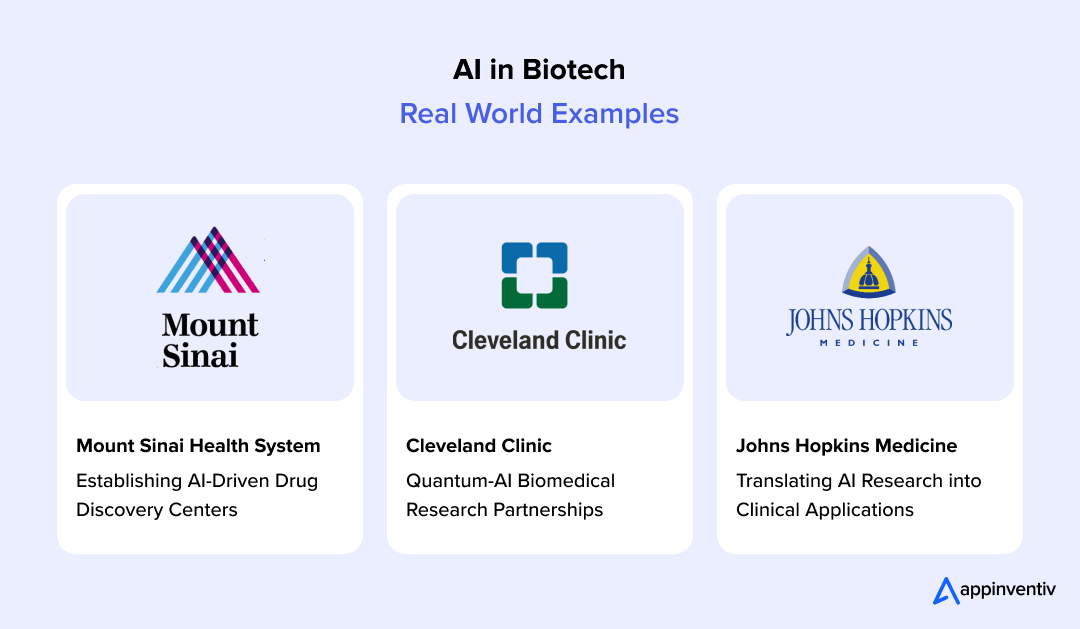
Mount Sinai Health System: Establishing AI-Driven Drug Discovery Centers
The Icahn School of Medicine at Mount Sinai has emerged as a frontrunner in AI biotech innovation:
- AI Small Molecule Drug Discovery Center: Integrates AI with traditional methods to design novel therapeutics, optimize compounds, and predict drug-target interactions for cancer, metabolic disorders, and neurodegenerative diseases. Led by Dr. Avner Schlessinger, it emphasizes speed and precision in drug discovery.
- Center for Artificial Intelligence in Children’s Health: Focuses on AI-driven pediatric care outcomes, expanding AI applications in specialized biotech.
Cleveland Clinic: Quantum-AI Biomedical Research Partnerships
Cleveland Clinic has pioneered a unique approach by establishing strategic partnerships that combine healthcare expertise with cutting-edge computational resources.
- Cleveland Clinic-IBM Partnership: 10-year Discovery Accelerator initiative combining Cleveland Clinic’s healthcare expertise with IBM’s hybrid cloud, AI, and quantum computing technologies.
- Key Achievement: First peer-reviewed publication from the partnership, using AI to identify new immunotherapy targets by analyzing peptide antigen molecular characteristics, moving beyond traditional methods.
- Impact: The team developed supervised and unsupervised AI to reveal molecular characteristics of peptide antigens, moving beyond traditional trial-and-error approaches to cancer antigen discovery.
Johns Hopkins Medicine: Translating AI Research into Clinical Applications
Johns Hopkins has established itself as a leader in bridging AI research with clinical implementation.
- Cancer AI Alliance: In October 2024, joined with Fred Hutchinson, Dana-Farber, and Memorial Sloan Kettering Cancer Centers.
- AI Tools: Developing tools to write physician notes from patient conversations, with future versions aiding treatment decisions, follow-up care, and specialist referrals.
- Drug Discovery: A 20-member team, led by Barbara Slusher, collaborates with the Bloomberg Kimmel Institute to develop immune-targeting cancer therapies for lab and clinical testing.
Challenges of AI in Biotech and Solutions
Artificial Intelligence (AI) is revolutionizing biotechnology, driving advancements in drug discovery, personalized medicine, and diagnostics. However, integrating AI into biotech presents significant challenges across various domains, including technical, scientific, regulatory, ethical, and economic considerations. Let’s explore these hurdles and propose actionable solutions to overcome them, ensuring AI’s transformative potential is fully realized in biotechnology.
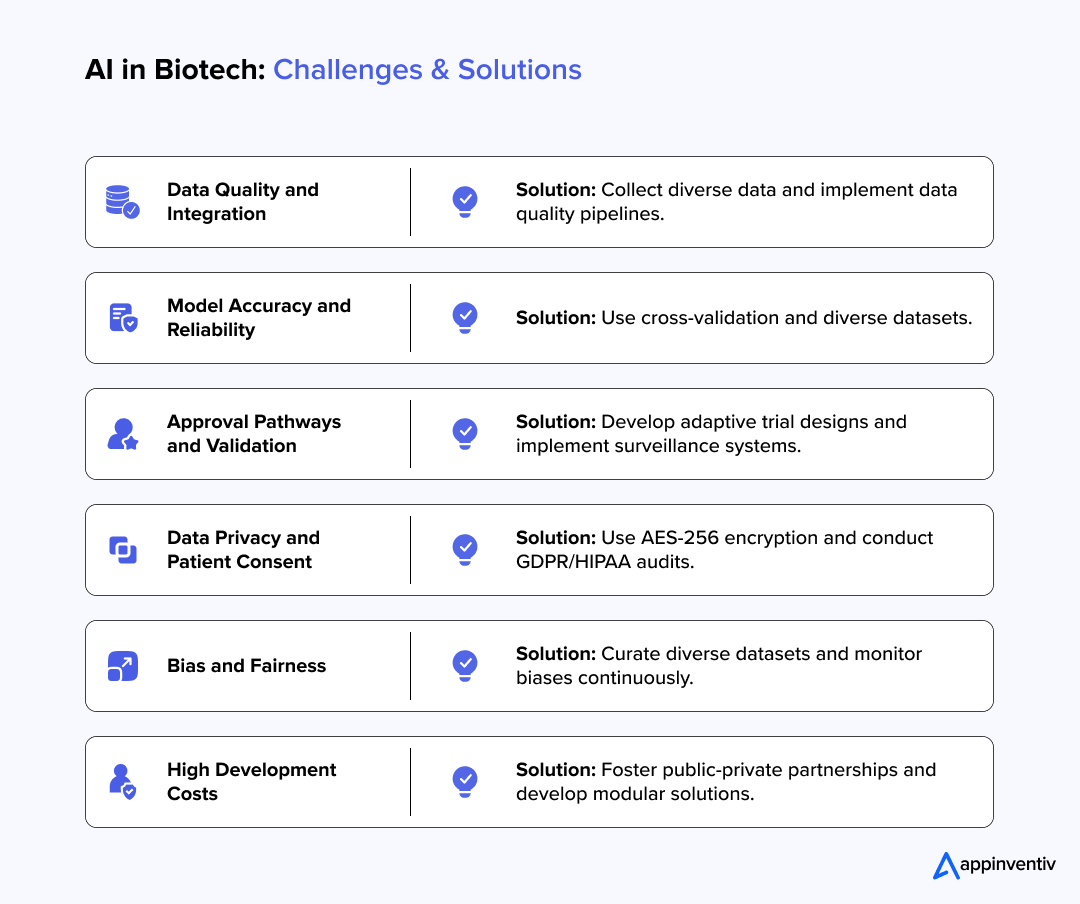
Technical and Scientific Challenges
Data Quality and Integration Issues
Challenge: One of the primary challenges in AI-driven biotechnology is ensuring the collection of high-quality, representative data. Clinical trial datasets often lack demographic diversity, leading to biased models with limited generalizability.
Solutions:
- Diverse Data Collection: Expand clinical trial recruitment to include diverse demographic groups, ensuring datasets reflect varied genetic, ethnic, and socioeconomic backgrounds.
- Data Standardization Protocols: Adopt frameworks like FAIR (Findable, Accessible, Interoperable, Reusable) principles to standardize multi-omics data.
- Interoperability Solutions: Use middleware platforms to bridge legacy systems and modern AI tools, reducing data silos through cloud-based data lakes.
- Data Quality Frameworks: Implement robust data quality assessment pipelines to identify and mitigate issues like missing values, outliers, or inconsistencies.
Model Accuracy and Reliability
Challenge: Incomplete or inaccurate data can lead to erroneous assumptions and imprecise predictions, a critical issue for machine learning in biotechnology. The “black box” nature of many AI models complicates explainability, making it difficult to validate results for clinical use.
Solutions:
- Enhanced Data Preprocessing: Use advanced data cleaning and augmentation techniques to address incomplete datasets.
- Cross-Validation and Testing: Employ rigorous cross-validation techniques and test models on diverse, real-world datasets to ensure generalizability.
- Continuous Monitoring: Implement real-time model performance monitoring to detect and correct drifts in accuracy.
Approval Pathways and Validation
Challenge: Regulatory agencies, such as the FDA and EMA, impose stringent requirements for AI in biotechnology applications. Designing clinical trials for AI systems is complex, as traditional protocols often fail to account for the adaptive nature of these algorithms.
Solutions:
- Regulatory Sandboxes: Collaborate with regulatory bodies to test AI systems in controlled environments, refining validation protocols to ensure effective and reliable outcomes.
- Adaptive Trial Designs: Develop flexible clinical trial frameworks that accommodate AI’s iterative learning capabilities.
- Global Harmonization Efforts: Support initiatives like the International Medical Device Regulators Forum (IMDRF) to standardize AI approval processes across markets.
- Post-Market Surveillance Systems: Implement robust monitoring tools to track AI performance and ensure compliance post-deployment.
Ethical and Social Considerations
Data Privacy and Patient Consent
Challenge: The application of Generative AI in biotech and healthcare relies on sensitive patient data, raising concerns about data safety and security. Compliance with regulations such as GDPR and HIPAA is non-negotiable; however, obtaining informed consent and anonymizing data effectively remain challenging. Breaches or misuse of data can erode public trust in AI-driven solutions.
Solutions:
- Robust Encryption: Use advanced encryption protocols (e.g., AES-256) to secure data during storage and transmission.
- Transparent Consent Processes: Develop clear, user-friendly consent forms that explain data usage and AI applications in simple terms.
- Data Anonymization Techniques: Apply methods like differential privacy or k-anonymity to protect patient identities while preserving data utility.
- Regular Audits: Conduct periodic compliance audits to ensure adherence to GDPR, HIPAA, and other regulations.
Bias and Fairness Issues
Challenge: Algorithmic bias is a significant limitation of AI in biotechnology, often outperforming human providers in consistency but risking unfair outcomes. Biases in training datasets can exacerbate health disparities, particularly when demographic groups are underrepresented in these datasets. Ensuring fairness across populations is crucial for delivering equitable healthcare.
Solutions:
- Diverse Training Datasets: Curate datasets that represent a wide range of demographics, including age, gender, ethnicity, and socioeconomic status.
- Bias Detection Tools: Use fairness metrics (e.g., demographic parity, equal opportunity) to identify and address biases in AI models.
- Inclusive Model Design: Involve diverse stakeholders, including patient advocacy groups, in the development process to ensure fairness.
- Continuous Bias Monitoring: Implement ongoing audits to detect and mitigate biases as models are deployed and utilized.
High Development Costs
Challenge: Developing AI-powered biotech solutions requires substantial investment in research, infrastructure, and talent. Long development timelines and uncertainty about return on investment (ROI) deter smaller players, while market adoption challenges slow the implementation of data-driven biotech solutions.
Solutions:
- Public-Private Partnerships: Foster collaborations between startups, academic institutions, and government agencies to share costs and resources.
- Incremental Development: Focus on modular AI solutions that can be developed and deployed in phases, reducing upfront costs.
- Market Education: Invest in awareness campaigns to demonstrate the value of AI-driven biotech solutions to healthcare providers and payers.
- Venture Capital Support: Leverage accelerator programs and venture capital tailored to biotech startups to bridge funding gaps.
Future Trends in AI in Biotech and Emerging Technologies: 2025-2030 Technology Roadmap
Transformative trends and emerging technologies will shape the technology landscape from 2025 to 2030. Artificial Intelligence (AI) will continue to advance with more sophisticated models, enabling personalized experiences and automation across various industries. Generative AI in Biotech will evolve with multimodal applications, autonomous labs, and AI-driven hypothesis generation, potentially automating entire research workflows.
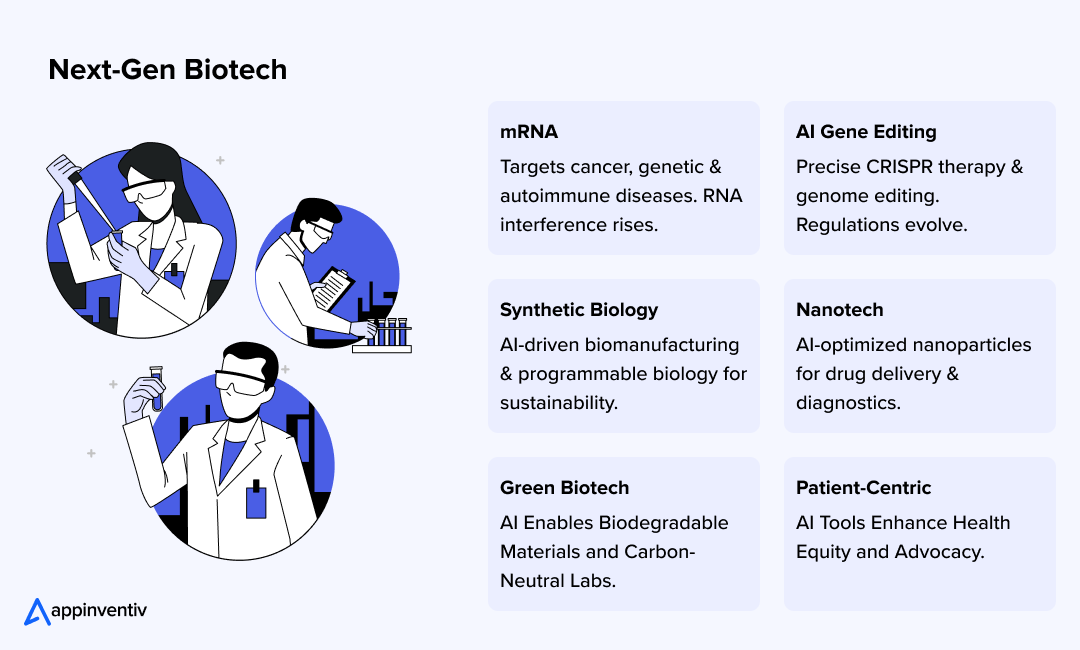
- Next-Generation Applications: mRNA technology will expand beyond vaccines to target cancer, genetic disorders, and autoimmune diseases, demonstrating AI’s broad therapeutic potential. RNA interference for gene silencing is expected to gain momentum, while quantum computing, enhanced by artificial intelligence, is poised to revolutionize computational biology.
- Gene Editing and CRISPR Integration: AI integration will provide unprecedented precision in gene editing, enabling AI-guided gene therapy and precise genome editing. Regulatory pathways will adapt to these advancements.
- Synthetic Biology Revolution: AI will drive sustainable biomanufacturing and synthetic biology applications, including programmable biology platforms, biocomputing, and living systems for diverse uses, including environmental solutions aligned with sustainability goals.
- Nanotechnology Convergence: AI-optimized nanoparticles will enhance drug delivery and diagnostics by crossing biological barriers, enabling targeted delivery, diagnostic nanosensors, and theranostic applications.
- Sustainability and Green Biotechnology: AI in Biotech will foster innovations in sustainability, such as biodegradable materials, carbon capture, and greener labs, enabling carbon-neutral manufacturing and circular economy applications.
- Patient-Centric Healthcare: AI-powered tools will democratize access and improve health equity through patient advocacy.
By 2030, these innovations will converge, creating smarter, more sustainable, and interconnected systems that will reshape economies and societies. Stay ahead by embracing these trends today.
Appinventiv’s AI smashes biotech roadblocks with unrivaled precision and innovation. Ignite your breakthroughs and seize tomorrow—join forces now!
Appinventiv: Your Trustworthy AI Development Partner For Your Biotech Reimagination
The comprehensive Use Cases of AI in Biotech explored throughout this guide demonstrate immediate opportunities for organizations ready to embrace AI and Biotechnology integration. Success stories from Mount Sinai Health System or Johns Hopkins Medicine validate the transformative potential of AI applications in Biotech. These organizations didn’t just adopt AI—they strategically implemented data-driven biotech solutions that revolutionized their operations.
However, the challenges of AI in Biotech demand careful planning, expert implementation, and ongoing optimization. Organizations need intelligent AI development partners who understand both the complexities of biotechnology and the capabilities of AI.
At Appinventiv, we specialize in developing AI solutions for biotech that address real-world challenges while ensuring regulatory compliance and scalability. Our comprehensive AI development services cover everything from initial strategy development to full-scale implementation and ongoing optimization.
Our Biotechnology AI expertise includes:
- Drug discovery acceleration through predictive modeling and compound optimization
- Clinical trial optimization with patient stratification and outcome prediction
- Biomanufacturing process control with real-time monitoring and quality assurance
- Precision medicine platforms that integrate genomic data with treatment recommendations
- Agricultural biotechnology solutions for crop optimization and sustainable farming
- Diagnostic tool development with advanced imaging analysis and point-of-care capabilities
Our team combines in-depth knowledge of the biotechnology domain with cutting-edge AI development services. We understand the unique regulatory requirements, data challenges, and implementation complexities that biotechnology organizations face. Our process begins with understanding your specific challenges and objectives, followed by the development of a customized roadmap for AI applications in Biotech that aligns with your strategic goals.
Schedule your consultation today and discover how Appinventiv can accelerate your journey toward AI-powered biotechnology excellence.
FAQs
Q. What ROI can enterprises expect from AI in biotech pipelines?
A. Enterprises can expect ROIs of 20-30% or higher from AI in biotech pipelines by reducing R&D costs, shortening development timelines (by 20-50%), and improving success rates in drug discovery through enhanced data analysis and predictive modeling.
Q. How can AI accelerate drug discovery and development?
A. AI accelerates drug discovery by analyzing vast datasets to identify targets, predict drug efficacy, optimize lead compounds, and streamline clinical trial design, reducing timelines by up to 2-3 years.
Q. What regulatory guidelines govern AI models in biotech (FDA, EMA)?
A. FDA’s AI/ML-based Software as a Medical Device (SaMD) framework and EMA’s Reflection Paper on AI (2023) govern AI in biotech, emphasizing transparency, validation, risk management, and post-market monitoring.
Q. How does AI help in drug development in biotech?
A. AI aids drug development by enhancing target identification, predicting drug interactions, optimizing formulations, automating data analysis, and improving clinical trial efficiency, leading to faster and more cost-effective outcomes.
Q. What is the role of artificial intelligence in pharma and biotech in personalized medicine?
A. Artificial intelligence in pharma and biotech drives personalized medicine by analyzing genetic, clinical, and lifestyle data to tailor treatments to individual patients. AI algorithms identify biomarkers and predict patient responses to specific therapies, enabling the development of targeted drugs. This approach enhances treatment efficacy and minimizes adverse effects, thereby advancing precision healthcare.
Q. How can biotech companies leverage AI to drive innovation?
A. AI for biotech can be leveraged in several ways, including precision medicine, predictive analytics, automated lab processes, personalized therapies, and real-time data integration, which fosters faster innovation and competitive differentiation.
Q. Is AI the future of biotechnology?
A. Yes, AI is pivotal to biotechnology’s future, driving breakthroughs in personalized medicine, drug discovery, and diagnostics, with its transformative potential already reshaping the industry.
Q. What are the ethical considerations of using AI in biological research?
A. AI in biological research raises ethical concerns such as data privacy, especially when handling sensitive genomic information, and the potential for biased algorithms that may skew results. Ensuring transparency, equitable access to AI tools, and rigorous validation of AI-driven findings are critical to maintaining ethical standards.


- In just 2 mins you will get a response
- Your idea is 100% protected by our Non Disclosure Agreement.
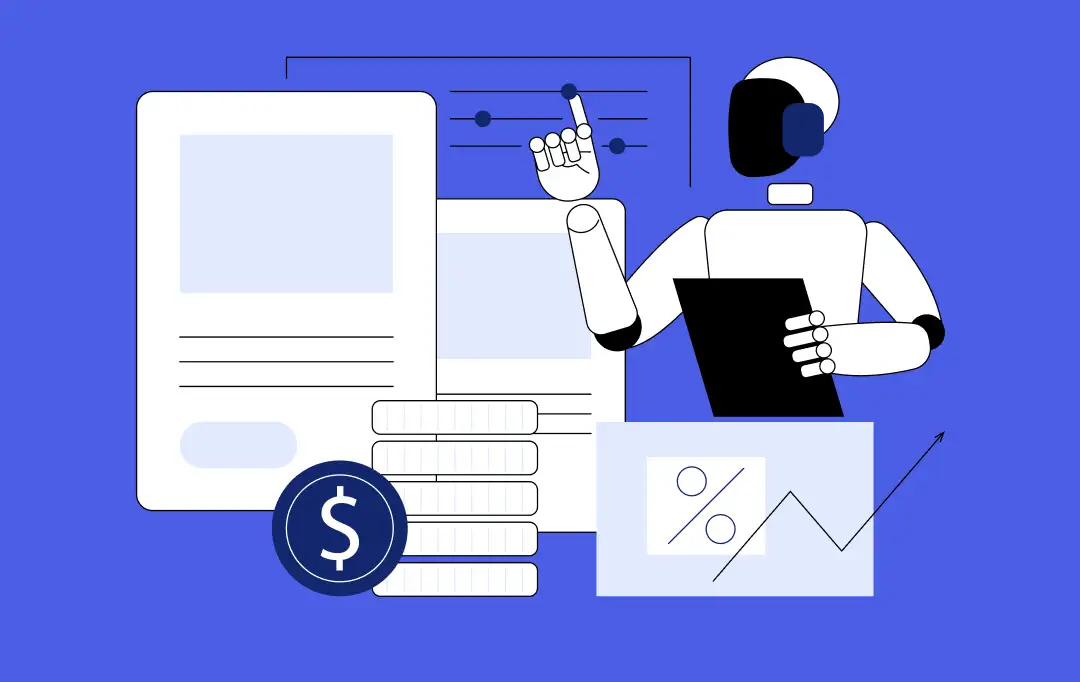
Data Mesh vs Data Fabric: Which Architecture Actually Scales With Business Growth?
Key takeaways: Data Mesh supports decentralized scaling, while Data Fabric improves integration efficiency across growing business environments. Hybrid architectures often deliver flexibility, governance, and scalability without forcing premature enterprise-level complexity decisions. Early architecture choices directly influence reporting accuracy, experimentation speed, and future AI readiness across teams. Phased adoption reduces risk, controls costs, and allows architecture…

Governance vs. Speed: Designing a Scalable RPA CoE for Enterprise Automation
Key takeaways: Enterprise RPA fails at scale due to operating model gaps, not automation technology limitations. A federated RPA CoE balances delivery speed with governance, avoiding bottlenecks and audit exposure. Governance embedded into execution enables faster automation without introducing enterprise risk. Scalable RPA requires clear ownership, defined escalation paths, and production-grade operational controls. Measuring RPA…
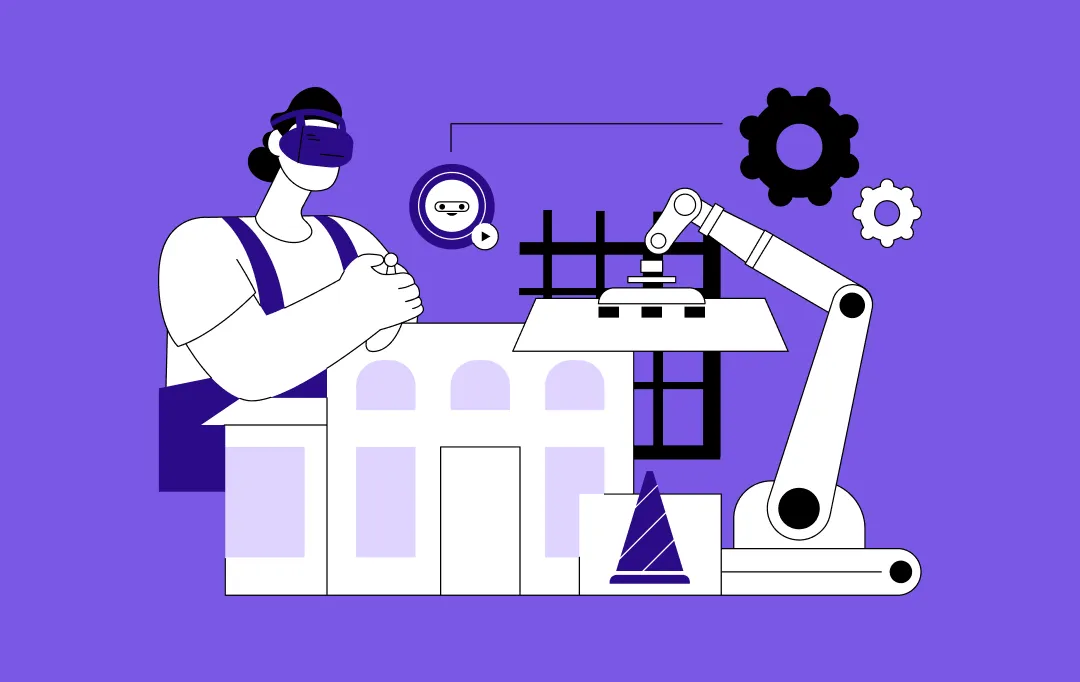
How AI Overhauling Industrial Automation in Australia
Key takeaways: AI is shifting industrial automation from rule-based to data-driven decision ecosystems Predictive and autonomous operations are improving efficiency and cost optimisation Australian industries are leveraging AI to solve workforce, sustainability, and compliance challenges Enterprises adopting AI early gain competitive, operational, and economic advantages Industrial automation in Australia is no longer just an engineering…


























